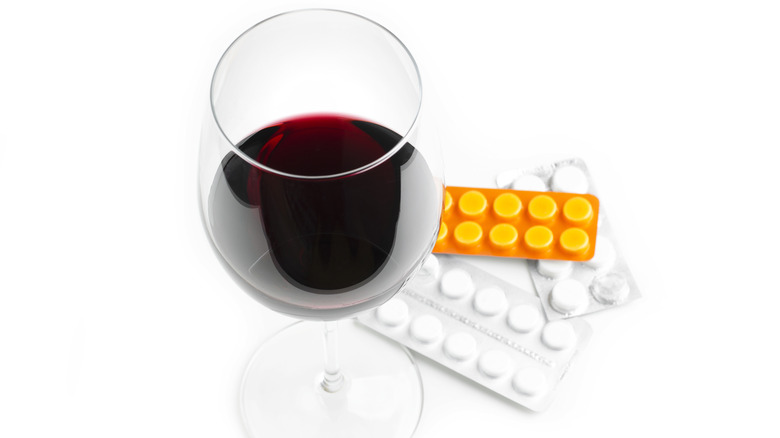Is It Safe To Drink Alcohol While Taking Allergy Medication?
If you suffer from allergies, you may rely on allergy medication to provide relief. You may have also noticed that your allergies feel particularly bad when you consume alcohol, which could make you more likely to turn to allergy medication while you're drinking. Despite allergy medication's wide availability, it's important to know that there are risks associated with combining them with alcohol, even if the drug's label doesn't explicitly state a warning (via Verywell Mind). Let's take a look at what the science says about allergy meds and alcohol.
First of all, alcohol can make allergy symptoms much worse, particularly for those with asthma or other nasal symptoms (via GoodRx Health). One 2006 study published in Addiction Biology found that alcohol itself was responsible for triggering an allergic response in some individuals, including rhinitis, itching, facial swelling, headache, cough, and asthma. In a survey of those with asthma, over 40% had an allergic response after consuming alcohol, and up to 35% claimed their asthma had worsened as a result of alcohol consumption. Unfortunately for wine lovers, wine showed the greatest potential for an allergic response, which may be a result of a common sensitivity to the sulfites found in the popular adult beverage (via Addiction Biology).
Alcohol can interact with allergy medications
In addition to alcohol's potential to trigger allergic responses, alcohol can interact with allergy medications and can cause drowsiness, dizziness, and an increased risk of overdose (via the National Institute of Alcohol Abuse and Alcoholism). By taking the two together, the felt effects of both are increased (via Verywell Mind).
As such, health experts suggest it's best to avoid alcohol if taking allergy medications, specifically Alavert, Atarax, Benadryl, Clarinex, Claritin, Claritin-D, Dimetapp, Sudafed, Triaminic, Tylenol Allergy Sinus, and Zyrtec (via the National Institute of Alcohol Abuse and Alcoholism). To better understand the specific effects, let's take a look at Benedryl as an example — a widely studied drug for its potential interactions with alcohol. Benedryl and alcohol combined can present life-threatening risks if certain daily activities, like driving or operating heavy machinery, are attempted (via Medical News Today). Additionally, loss of consciousness can occur, leading to falls. A greater risk of dehydration can lead to more extreme hangover symptoms, and memory can be exponentially impaired (via Medical News Today).
It's important to check with your healthcare provider or pharmacist for potential interactions between your specific allergy medication and alcohol. Always be aware of the risks associated with combining the two.


